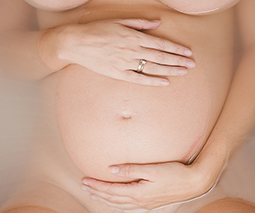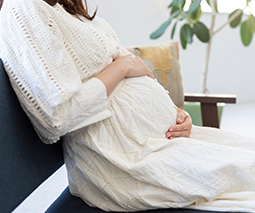The “fourth trimester” is real and here is what it means for mums and babies

Much is (quite rightly) made of the first three trimesters, but things get really real in the fourth trimester, when mums and babies truly get to know one another.
What is the fourth trimester?
The first three months of life after birth are referred to as the fourth trimester and denotes those foggy, squishy, soggy days when babies are learning to be part of the world, away from the comfort and safety of the womb.
It’s not just babies who are adapting and awakening, though. New mums are getting an education too, navigating shifting bodies (boobs! bellies! bottoms! bits!) and tackling the very steep learning curve that becoming a mother is.
The fourth trimester extends those sluggish final weeks of pregnancy, and encourages women to rest as much as possible (not always easy!), take the pressure to “bounce back” off themselves and get to know their babies – and recover.
Why is the fourth trimester so important?
While women become mothers with babes in arms in a life-changing instant, growing into the role can take much, much more time.
The fourth trimester honours this remarkable evolution – and highlights how important it is to support mothers through these early days. It’s also a reminder to mums that this period is kind of like the Twilight Zone of parenting, where they shouldn’t expect too much of themselves and can hopefully ease themselves into the role.
This trimester is not all about mental adjustments though. Postpartum bodies also pose quite the physical challenge for mums of new babies, as they work hard to make milk, contract uteruses, recover pelvic floors and attempt to poop without pain – all while feeling slightly bewildered and sleep deprived.
Add baby blues, engorged breasts, fluctuating hormones, postpartum bleeding and potential for anxiety and depression to the mix, and you’ll see why women need to be cared for – and take care of themselves – as they learn to care for their bubs.
This newborn baby bubble period is full of special moments, but is also not for the faint-hearted. You’re probably beginning to see why it deserves its own special label – and accompanying down time.

Fourth trimester life tips for mums (and their friends and family)
So, now that we know what the fourth trimester is, how can mums make this final phase of baby-making easier on themselves? Well, there are lots of ways, but they mostly fall into two categories:
1. Asking for help
The optimal tip for fourth trimester care is having the courage to ask for help! Loved ones can help to facilitate this by offering tangible support rather than vague queries about how things are going.
“Can I pick up some groceries and drop them on your doorstep later today?” or “Shall I pop in and hold the baby while you have a shower?” or “Can I walk the baby around the block for half an hour while you and hubby have dinner alone?” are much better than “Can I do anything for you?”
Women often feel a bit shy about piping up and asking for a hand, so clear offers of assistance are a much better idea. This also sets new mums up with a kind of village of supporters, so they don’t have to tough things out alone.
2. Self-care every day
The other important tip is to make self-care a priority. This doesn’t mean days at the spa – although that’s a great idea – because time, childcare and maternity-leave budgets don’t usually allow this. Rather, it means building (or sneaking) in tiny – or bigger – blocks of time when they present themselves to do things that make you feel like yourself again.
Perhaps it’s listening to a podcast while you walk your baby in the park. Maybe it’s picking up coffee and a pastry from the drive-through as your baby dozes in the back seat of the car. It could be binge watching something you missed the first time around while your baby snuffles through those gruelling night feeds?
Enriching or entertaining self-care is not the only kind you should be aiming for. Back-to-basics self-nurturing, eating well, drinking plenty of fluids, resting when you can, reducing obligations/social commitments, seeing medical professionals when appropriate, wearing comfy clothes and caring for your body, in general, are all really important too.
Add yourself to the daily to-do list in tiny – or bigger – ways.

Fourth trimester life for babies
Babies have a lot of adjusting to do too, as they get used to life outside the womb. This fourth trimester is all about these shifts.
Your baby’s vision and hearing are still developing, adapting to the newly-amplified sights and sounds in the outside world. They’re no longer constrained by the dimensions of your belly, instead they’re free to move their limbs and body in ways they never have before. Their brains are shifting and changing too, as they respond to stimuli they’ve previously never encountered.
You can help your newborn bridge the gap between womb life and post-birth life by being mindful of these before and after shifts. Wearing your baby in a sling can help to replicate the feeling and movement of life in utero, which can calm and settle your fourth trimester bub. Keeping the environment quiet and calm in the early days can help ease the transition too.
In these early weeks of the first trimester you’ll probably see these sort of changes in your baby:
- Beginning to form more consistent feeding and sleeping patterns and cues
- Crying: Tiny babies cry a lot as they learn to moderate feelings and communicate
- Sleeping: Fourth trimester babies spend a lot of time sleeping
- Feeding: Babies feed a lot in these early weeks, as their tiny tummies empty quickly and they get hungry very frequently
- Startling less and learning to control their movements more
- Responding to people, objects, sights and sounds more
- Eliminating: Poop, spit-up, full-blown chuck
Fourth trimester traditions
Many cultures establish a “lying in” or “confinement” period in the fourth trimester, to encourage bonding and promote health and recovery in new mums. This period can range from 2 weeks to 2 months, with bedrest encouraged for the early part of this self-imposed rest time.
In Japan, there’s a tradition that suggests a new mother stays in bed, at her parents’ home, for three weeks after the birth of a child. The family supports mother and child in these early days.
Chinese mothers might enter a traditional 30 day confinement period, as part of their fourth trimester care. It involves dietary and lifestyle restrictions aimed at making sure mums and babies are as healthy as possible in the weeks that follow birth.
In some Latin American countries, women begin six weeks of La Cuarentena after the birth of their baby. They avoid any strenuous activity and concentrate on breastfeeding and bonding/caring for their baby as family members support them with household tasks and caring for any other children.
The Balinese believe that fourth trimester babies are holy, so much so that their feet must not touch the ground until they are 3 months of age. Family members help care for the new baby, to ensure that this tradition is upheld and the new mum is supported in the process.
Perhaps you’d like to establish your own fourth trimester tradition, enlisting the support of family and friends, prioritising nourishment and rest, and easing yourself back into life with your new baby, once you’ve both had a little time to recover from the rigours of pregnancy and birth?
Sounds like the very best idea to us!










